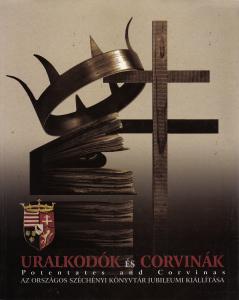
Potentates and Corvinas
Potentates and Corvinas
An exhibition of National Széchényi Library to celebrate the bicentenary of its foundation 16 May 2002 – 20 August 2002.
Edited by Orsolya Karsay
With the contribution of Ferenc Földesi
The exhibition and the catalogue edition was coordinated by Barbara Kiss
NSZL, Budapest, 2002., 288 pages
ISBN 978 963 200 441 8
This volume presents the contents of the international Corvina exhibition organized for the bicentenary of the foundation of our Library, and some related papers about Italian and Hungarian Humanism, and the libraries and collections of rulers. The exhibition featured new academic approaches, and added newly discovered Corvinas to the already known ones. The collection at the Biblioteca Medicea Laurenziana of Florence contains 150-200 codices made upon the order of King Matthias that finally did not arrive to Buda as the king died in the meantime. They entered the collection of the Medici instead, and remained undiscovered for more than 500 years.
Our exhibition had the opportunity to present 19 codices from this newly discovered unit, together with Corvinas borrowed from Vienna and Wolfenbüttel, and items belonging to our own collection. The presentation of the libraries of rulers as King Matthias, the Medici, the Habsburgs and the Princes of Wolfenbüttel, was a great occasion for the organizers to shed new light on the one-time relation between power and culture. The exhibition gave room to highlight a special form of private library and book collection, the studiolo, an intimate place of study that served to its owner as a tool of legitimation of power just as libraries did in Italy as well as in Buda. The third pillar of the exhibition was the all’antica style of painting, typical of the antique style of the Corvinas, that cannot be interpreted without understanding the representation of aristocratic power.
Apart from these central topics, the papers of our volume also touch upon points of view that due to their character are not so suitable to be displayed in an exhibition, but are closely related to Corvina research. Such topics are the academic symposia of Buda and the history of the Corvinas that belong today to the collections of Vienna and Wolfenbüttel.
Shopping
Our publications are available in our bookshop, or can be ordered from the Publications Department of the NSZL using the contact details below: Főigazgatói Kabinet kiadványtára, Országos Széchényi Könyvtár, 1276 Budapest P.O. box 1205., phone: 06-1-23-23-506, e-mail: kiadvanytar@oszk.hu.




